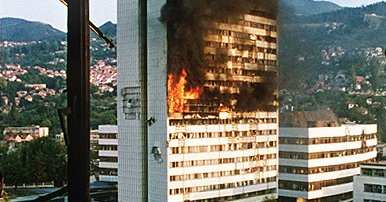On 6 April, the city of Sarajevo marked 20 years since the beginning of the longest siege in modern history from 5 April 1992 to 29 February 1996 and during which 11,541 of its citizens were killed including more than 1,000 of children.
Worst Atrocities Europe Saw Since Nazi Era
Bosnia’s war, which brought the worst atrocities Europe had seen since the Nazi era, began 20 years ago. In 1991, Bosnia and Herzegovina was populated by a mix of 43.4 per cent Muslims (known today as Bosniaks), 31.2 per cent Serbs, 17.3 per cent Croats, 5.5 per cent Yugoslavs and others accounting for 2.3 per cent. In early 1992, 98 per cent of Bosnia-Herzegovina citizens voted in favour of the independence and as soon as the country received its international recognition, the war began including the siege of the capital of Sarajevo.
Today, it is estimated that more than 100,000 people were killed during the war while dozens of women were raped and hundreds of thousands of people were forced out of their homes or fled before a Dayton peace accord was signed in 1995.
The siege brought enormous suffering and misery to some 400,000 inhabitants of the Bosnian capital at the time. Constantly shelled and sniped, people were cut off from food, medicine, electricity and water. Thousands of civilians were killed and wounded. During the war, people in Bosnia and Herzegovina witnessed all sorts of human rights violation or abuse including rape, ethnic cleansing and mass executions.
Today Bosnia Divided More than Ever
Today, 16 years since the end of the war, Bosnia is more divided than ever. Intermarriage between the three principal ethnic groups – Muslim Bosniaks, Catholic Croats and Orthodox Serbs – is far less common that it was before the war, and children in Bosnia’s two constituent entities, a Bosniak-Croat federation, and a Serb republic (Republika Srpska) are now growing up with minimal contact with each other. Furthermore, the lack of trust between these three ethnic groups as well as economic differences between the “mini-states” are keeping them separated.
Children in schools are learning three different versions of history, calling their common language by three different names - Serbian, Bosnian and Croatian. As a result they are growing isolated from each other. Also, foreign investors, as the only hope for the country’s economy, are avoiding Bosnia for its political instability and its enormous bureaucracy.
Never Say Never
After the end of World War II, people reiterated “Never again…,” but today, as Sarajevo marks 20 years of its siege which went on longer than the World War II 900-day siege of Leningrad (today St. Petersburg), this city is the living proof of the saying never say never.
In addition, it is also impossible to escape the feeling that the international community had let people of Bosnia-Herzegovina down during the war. The international community only condemned the horrors and send food packages during the war. However, what these people really needed was an end to the death and destruction they had been experiencing every day for almost four years.
Therefore, instead of promising that Europe will never again see such terrible atrocities on its continent, let’s learn something from this and help people of Bosnia-Herzegovina heal and move forward towards brighter and happier European future!

Follow the comments: |
|
